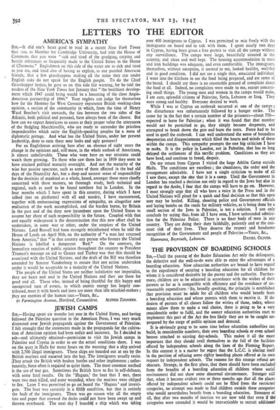LETTERS TO THE EDITOR
AMERICA'S SYMPATHY
SIR,—It did one's heart good to read in a recent New York Times that you, as Member for Cambridge University, had told the House of Commons that you were " sick and tired of the grudging, carping and hostile references so frequently made to the United States in the House of ammons." Englishmen on this side of the water are as sick and tired as you are, and tired also of having to explain, to our puzzled American friends, that a few grasshoppers making all the noise they can under English oaks do not speak for the English people. To do the Chief Grasshopper justice, he gave us on this side fair warning, for he told the readers of the New York Times last January that " the healthiest develop- ment which 1947 could bring would be a loosening of the close Anglo- American partnership of 1946." Your readers can judge for themselves how far the Member for West Coventry represents British working-class opinion, a section of the community in which, from the time of Henry Ward Beecher's visit onwards, the ties between the two sides of the Atlantic, both political and personal, have always been of the closest. But how can we expect Americans to assess at their proper value the utterances of the fledgling Macchiavellis, who are ready to surrender the priceless imponderables which unite the English-speaking peoples for a mess of diplomatic pottage. And what has the United States, under her present leadership, done to earn these sour looks and ugly gestures?
For an Englishman arriving here after an absence of eight years the change in the opinions and, still more, in the whole outlook of Americans, is almost unbelievable. Those who were here on war missions could watch them growing. To those who saw them last in 1939 they seem to have attained political maturity overnight. And not the maturity of the wise but passive spectator, such as some of them affected in the bad old days of the Neutrality Act, but a deep and earnest sense of responsibility for the destinies of mankind as a whole, based, amongst those more closely concerned with these matters, on thorough study, both technical and regional, such as used to be found nowhere but in London. In the four months which I have spent in this country, during which I have talked (not on platforms) with all and sundry, I have encountered, together with embarrassing expressions of sympathy, an altogether new realisation of the work accomplished, and the burden borne, by Britain in the past and of the duty now incumbent upon the United States to assume her share of such responsibility in the future. Coupled with that and equally widespread is the determination that this new effort shall be undertaken, in some way or other, under the auspices of the United Nations. Lord Russell had been strangely misinformed when he told the House of Lords on April 30th, on the authority of " a man just returned from America," that " in that country any person who favours the United Nations is labelled a dangerous Red." On the contrary, the immediate reaction of public opinion throughout the country to President Truman's message on aid to Greece and Turkey was that this should be associated with the United Nations, and the draft of the Bill was therefore amended by Senator Vandenberg to ensure that any action undertaken under it would be acceptable to a majority of the United Nations.
The people of the United States are neither isolationist nor imperialist, they are heart and soul in the United Nations and they are there for good and all. Those who, instead of being thankful for this happy and unexpected turn of events, to which atomic energy has largely con- tributed, meet it with howls and jeers are more than idle mischief-makers ; they are enemies of the human race.—Yours, &c., 30 Farmington Avenue, Hartford, Connecticut. ALFRED ZIMMERN.


































 Previous page
Previous page